Problem Solving: Key Skills for Career Success
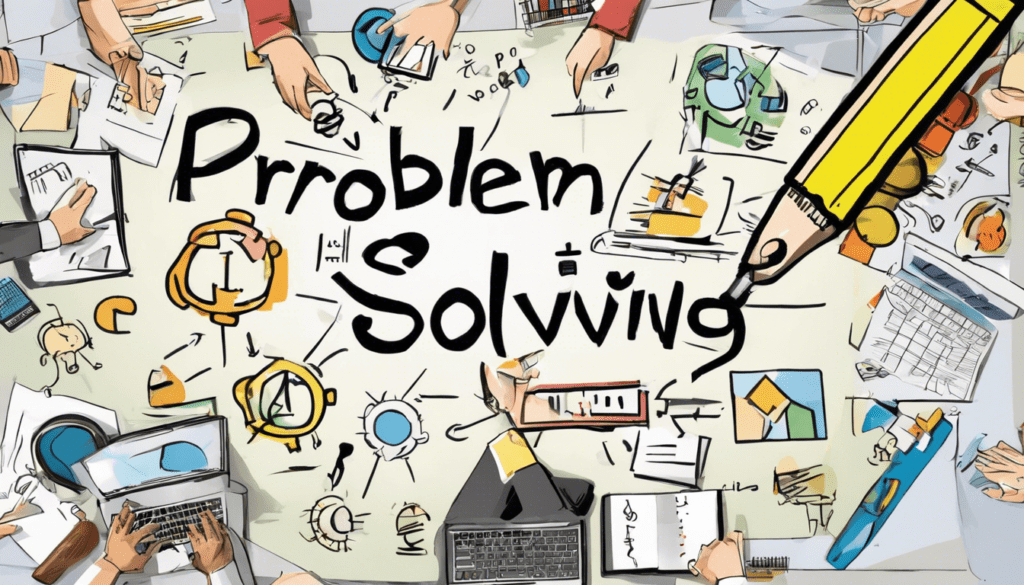
Problem Solving Skills enable individuals to navigate the uncertainties of the modern business landscape with confidence building and agility. Moreover, mastering these skills is indispensable for those aiming to advance their careers. And as it reflects an ability to analyze situations, devise effective solutions, and implement them strategically.
In today’s rapidly evolving workplace, problem solving stands out as a pivotal skill that can mark the difference between success and stagnation. This critical ability not only helps individuals tackle complex challenges but also drives innovation and efficiency across various industries. Recognized universally as a core component of professional success. Problem solving skills enable individuals to navigate the uncertainties of the modern business landscape with confidence and agility. Moreover, mastering these skills is indispensable for those aiming to advance their careers, as it reflects an ability to analyze situations, devise effective solutions, and implement them strategically.
Why Problem Solving is a Crucial Skill
Table of Contents
Toggle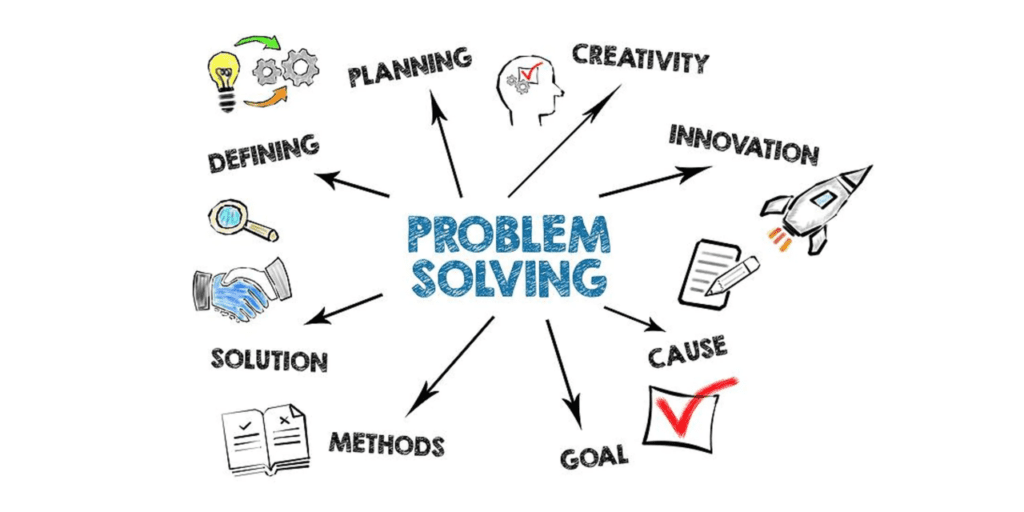
Problem Solving skills are crucial for career success for several reasons. They equip individuals to handle tough or unexpected situations at work and tackle complex company issues effectively. An employee who can solve a variety of problems without panicking is a valuable asset to any organization. Moreover, team members who can find solutions on the spot usually feel more confident over time, thus taking on more responsibilities and performing more efficiently.
Everyday Application of Problem Solving
Problem solving is a skill that we use in our daily lives without even realizing it. From avoiding traffic jams to saving money, we make good use of our problem solving abilities, often automatically. We recognize a problem, make a plan to solve it, and then see the outcome.
Innovative Thinking
To develop innovative solutions, one must be open-minded and maintain logical and objective thinking so that choices are based on facts. This way, individuals can analyze problems from different perspectives, troubleshoot effectively, and identify areas for improvement in the future. The ability to solve problems can also help employees take proactive steps to communicate their concerns with managers and seek recognition or promotion.
Organizational Needs
The shift towards an innovation-driven economy has driven the need for organizations to continually innovate. Find new ways of working, new products, and new solutions, and move beyond problems to resolution quickly. Effective problem solving skills enable employees to analyze problems, identify their severity, and assess the impact of alternative solutions.
Future-Proofing Careers
Three-quarters of educators surveyed believe that students need to develop problem solving skills to protect their futures As professions that require creative problem solving are less likely to be impacted by automation.
Additionally, almost 90% of respondents believe that students who excel at creative problem solving will have higher-earning job opportunities. In the future, and 85% agreed that these skills are in high demand by today’s employers for senior-level and higher-paying careers.
Employer Demand
The World Economic Forum (WEF) surveyed 350 executives across 9 industries in 15 of the world’s biggest economies. And found that the number one skill employers will need in their employees in the future is problem solving ability. The report shows that 36% of all jobs across all industries will require complex problem solving abilities as a core skill by 2020. A study by iCIMS also found that recruiters place a higher value on soft skills, with the ability to solve problems being the most important, sought by 62% of recruiters.
Workplace Necessity
All work environments, regardless of size and sector, encounter problems. Whether the issues are small or large in terms of scale and impact, occur on a daily basis or less frequently, or are likely to arise in certain business functions over others, they are nevertheless a universal reality shared by all companies. As such, it’s fundamental that employees and team members possess the necessary lateral thinking skills and know-how to problem solve on the job.
Problem solving abilities underpin a wide variety of other useful competencies that employers often look for. Such as logic, critical and creative thinking, proactivity, resilience, teamwork and communication, imagination and innovation, adaptability, and determination. While solving problems is often regarded as the remit of senior leadership, the entire workforce’s ability to tackle difficult problems and identify the best possible solutions should not be underestimated – it’s a critical resource .
Individuals who consistently excel at problem Solving, bringing in new ideas and ways of thinking, finding potential solutions. And creating opportunities, troubleshooting existing practices and processes, and saving time and money. They are more likely to stand out from the crowd and find themselves fast-tracked for career advancement over their peers.
Empowering Your Career with Problem Solving Skills

Developing strong problem solving abilities can empower individuals to excel in their careers. These skills enable them to navigate challenges, drive innovation, and position themselves as invaluable assets to their organizations.
Analytical Skills
Effective problem solving begins with analytical thinking. To identify the root cause of a problem, one must gather relevant data, analyze it objectively, and draw meaningful insights. This process involves research, data collection, and logical reasoning to uncover the underlying factors contributing to the issue at hand. By honing analytical skills, individuals can systematically assess situations, avoid generalizations, recognize logical fallacies. And make calculated judgments , ultimately leading to more informed and rational solutions.
Creative Thinking
While analytical skills are crucial, creativity plays an equally vital role in problem solving. Creative thinking fosters the ability to develop out-of-the-box ideas and unconventional solutions that set individuals and organizations apart from their competitors. Activities such as drawing, knitting, and journaling can stimulate alpha waves in the brain. Promoting relaxation and increasing the likelihood of “aha” moments when seemingly impossible problems become solvable. Embracing a beginner’s mindset, asking questions, and combining diverse ideas can nurture creativity, enabling individuals to approach problems from fresh perspectives.
Resilience
Effective problem solving often involves facing setbacks and failures. Cultivating resilience is essential for persevering through these challenges. A growth mindset helps individuals view failures as opportunities for learning and growth rather than setbacks. This resilient approach fosters a culture of experimentation, innovation, and continuous improvement. By dedicating time to explore, experiment, and create without constraints, individuals can foster creativity, take risks, and discover new avenues of expression. By ultimately enhancing their ability to overcome obstacles and find innovative solutions.
Embracing problem Solving skills empowers individuals to adapt to new technologies and trends, overcome challenges with resilience and innovation, and turn failures into opportunities for growth. These skills not only contribute to personal and professional success but also position individuals as valuable assets to their organizations, capable of driving innovation and addressing complex issues effectively.
Building Strong Analytical Skills for Problem Solving Skills

Definition
Analytical skills refer to the ability to collect, process, and interpret data and information to solve problems, make decisions, and communicate effectively. They involve breaking down complex issues, identifying patterns, brainstorming ideas, observing and interpreting data, integrating new information, and synthesizing insights to arrive at logical solutions
Ways to Enhance Problem Solving Skills
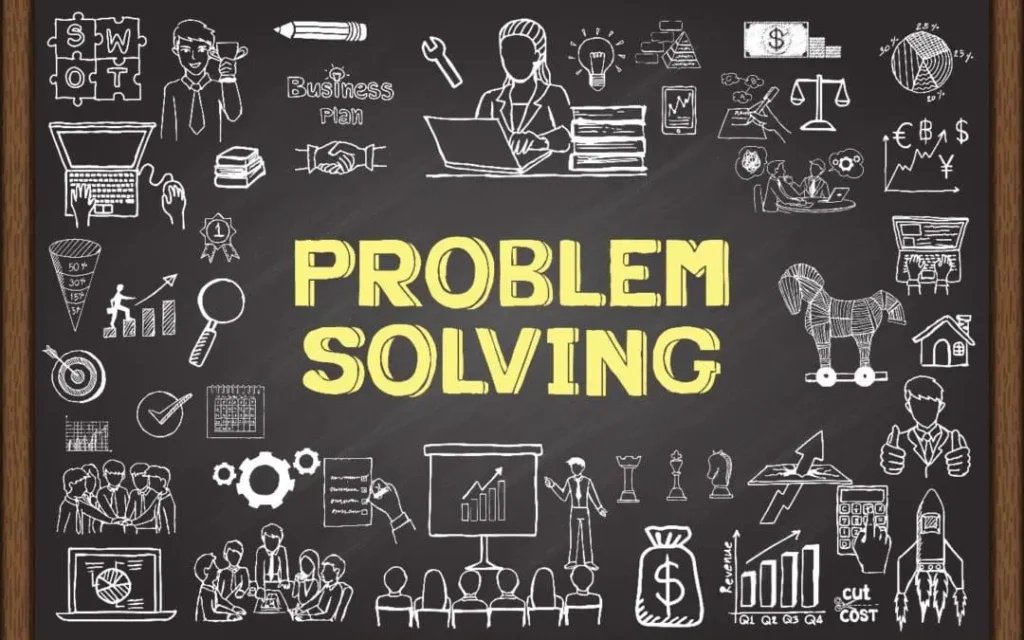
1) Expand Knowledge and Challenge Assumptions:
Expose yourself to diverse sources of information, perspectives, and arguments. Read widely and critically from various materials like news articles, novels, blogs, podcasts, and videos. Question your assumptions, identify biases, and challenge logical fallacies to expand your thinking horizon and reduce cognitive biases.
2) Practice Problem Solving and Decision-Making:
Actively engage in problem Solving and decision-making exercises across different situations and contexts. This practice will enhance your ability to break down complex problems, evaluate potential solutions, and choose the best course of action.
3) Learn New Skills and Tools:
Acquire new skills and tools relevant to your field or industry, such as data analysis, programming, statistics, or visualization. These tools can enhance your ability to collect, process, and interpret data, ultimately improving your analytical capabilities.
4) Seek Feedback and Mentorship:
Leverage feedback and mentorship opportunities to gain valuable insights, guidance, and support. Feedback can help you identify strengths, weaknesses, and areas for improvement, while mentors can share their experiences and expertise.
5) Collaborate and Brainstorm:
Engage in collaborative brainstorming sessions with colleagues, friends, or mentors. Bouncing ideas off others, considering different perspectives, and receiving honest feedback can challenge your thinking and enhance your analytical skills.
6) Reflect and Review:
Regularly reflect on and review your progress, achievements, and areas for improvement. This self-assessment can help you recognize your growth, celebrate successes, and identify opportunities for further development of your analytical skills.
7) Cultivate Humility and Openness:
Approach your knowledge with humility, recognizing that you cannot possess all perspectives. Remain open to learning, listening more, and opining less, as this mindset fosters continuous growth and analytical prowess.
8) Challenge Presumptions:
Actively challenge your presumptions and assumptions, considering alternative viewpoints and seeking evidence to confirm or refute your beliefs. This practice can help overcome cognitive biases and logical fallacies, enhancing your analytical objectivity.
Fostering Creative Thinking
Creative thinking plays a pivotal role in effective problem solving. It fosters the ability to develop out-of-the-box ideas and unconventional solutions that set individuals and organizations apart from their competitors. While analytical skills are crucial for identifying the root cause of a problem, creativity is equally vital for generating innovative solutions.
Role in Problem Solving
Creative problem Solving encourages exploring open-ended solutions and developing new perspectives. It helps overcome unforeseen challenges and find solutions to unconventional problems. Creative problem solving operates primarily in the ideation phase of design thinking. But can be applied to other phases as well, as design thinking is an iterative process that moves between stages as ideas are generated and pursued .
One way to innovate is by creating a story about a problem to understand how it affects users and what solutions best fit their needs. This empathetic approach, known as the “alternate worlds” tool, encourages considering how someone from a different background would approach a similar situation. It is not intended to instantly solve problems but rather to stimulate idea generation and creativity.
Tools and Techniques for Effective Problem Solving
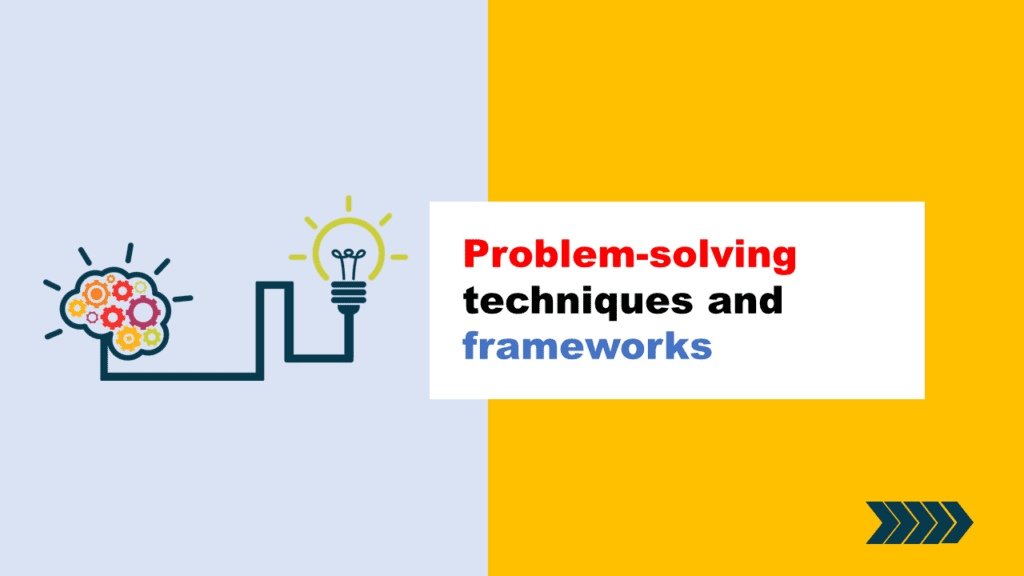
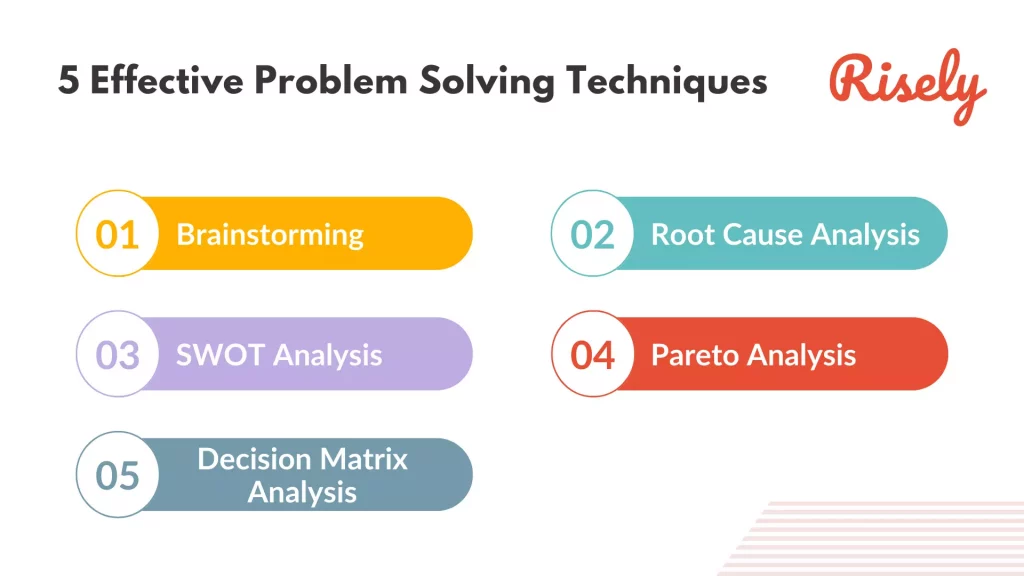
Brainstorming
Brainstorming is a powerful technique that facilitates the generation of multiple inventive ideas or solutions for a particular issue or subject. It aims to build a creative and encouraging atmosphere where team members can freely articulate their thoughts without restriction. By allowing them to expand on each other’s ideas and collaboratively arrive at creative solutions.
The effectiveness of brainstorming stems from the diversity of perspectives and experiences that team members bring to the table. As individuals approach problems from various angles, a broader range of ideas and solutions emerges. This collaborative process encourages active participation, enabling team members. To build upon each other’s suggestions, expand upon initial concepts, and create synergistic solutions .
Root Cause Analysis
Root cause analysis (RCA)is the process of systematically identifying the root causes of problems to devise appropriate solutions. It emphasizes addressing underlying issues rather than merely treating symptoms. As it is more effective to prevent and solve for root causes .
The primary goal of RCA is to discover the root cause of a problem or event. The second goal is to fully understand how to fix, compensate, or learn from any underlying issues within the root cause. The third goal is to apply the insights gained from the analysis to systematically prevent future occurrences or replicate successes.
Effective Communication in Problem Solving

Effective communication is a critical component of successful problem solving, especially in team settings. It facilitates the exchange of diverse perspectives, fosters collaboration, and enables coordinated action towards finding solutions. Here’s why effective communication is crucial in problem solving:
Importance
1) Sharing Insights and Information: Each team member brings unique expertise, knowledge, and perspectives that can aid in the problem solving process. Communication ensures that everyone’s contributions are captured, appreciated, and encouraged, leading to a more comprehensive understanding of the problem and its impacts.
2) Aligning Perspectives: Team members may have different viewpoints on the problem and its relation to the broader organizational context. Effective communication helps align these diverse perspectives, enabling the team to develop an accurate and comprehensive understanding of the problem and its implications.
3) Considering Broader Impacts: Without effective communication, there is a risk of making decisions that only address immediate symptoms or parts of the system directly associated with the issue at hand. By including a broader stakeholder audience in problem communications, decision-makers. It can solicit input on the broader impacts and select actions that benefit the entire organization.
4) Coordinating Activities: Solving complex problems often involves multiple moving parts and coordinating the activities of team members to ensure efficient use of resources and avoid conflicts or duplication. Effective intra-team communication is essential for everyone to understand their roles and responsibilities.
5) Knowledge Sharing: Problem solving teams gain valuable knowledge through their analysis, decision-making, and implementation processes. Effective organizational communication can help disseminate this knowledge, enabling the organization to avoid similar situations or expedite resolution if they occur again.
6) Building Stakeholder Confidence: Stakeholder confidence in a team’s problem solving abilities is based more on what is communicated than what is actually done. Deliberate, timely, and thoughtful stakeholder communication can reduce external pressure on the problem solving team.
Conclusion
Throughout this exploration, we’ve navigated the essential terrain of problem solving skills, a compass by which professionals can chart a course towards career success. Emphasizing the importance of analytical and creative thinking, resilience, effective communication, and collaborative approaches. We’ve seen how these skills underpin our ability to confront and conquer the myriad challenges that the modern workplace presents. By fostering these capabilities, individuals not only enhance their professional value. But also equip themselves to drive innovation and strategic growth within their organizations.
In embedding the spirit of inquiry and adaptability, we’ve also highlighted the critical role of adopting a humanized approach in problem solving. A reflection of the overarching need to relate, understand, and innovate in a manner that respects and harnesses the diversity of human experience. As we move forward, let us take with us the knowledge that the evolution of problem solving skills. It is not a static endeavor but a dynamic journey of continuous learning and growth. By doing so, we not only pave the way for individual success but also contribute to the collective advancement of our workplaces and society at large.
